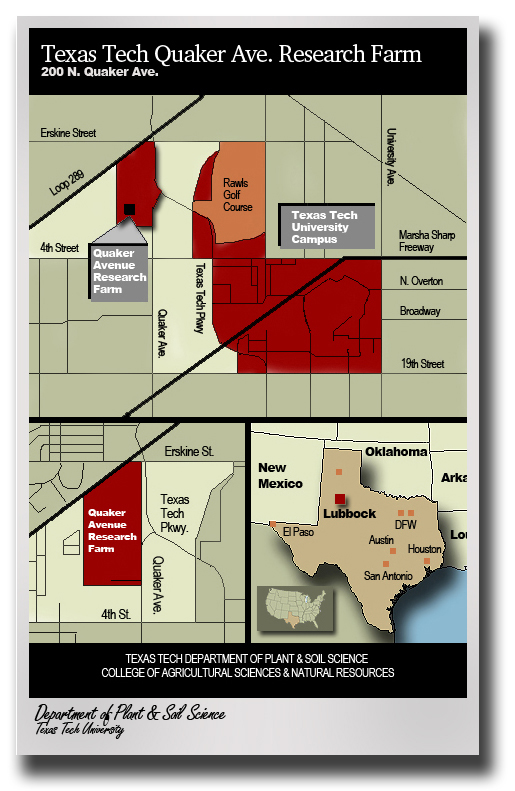Quaker Ave. Research Farm

The Quaker Avenue Research Farm is a 130-acre farm operated by Texas Tech University's Department of Plant and Soil Science. Researchers from plant and soil science, other departments at Texas Tech, Texas AgriLife Research, Texas AgriLife Extension, and many agribusiness companies conduct research at the farm. The farm is located at 200 N. Quaker Avenue, just north of 4th street, less than a 10 minute drive from the center of the Texas Tech campus. The farm is located at 33° 41' 36.4596" N, -101° 54' 18.612"W, the elevation is 3,256 feet (992 m) above sea level, and the average annual rainfall is 18.6 in (472 mm). The average dates of last and first frosts are April 1 and November 9, respectively.
The farm has 120 acres for large- and small-plot research, and 13 acres for turfgrass research. The entire farm is irrigated from two groundwater wells producing 800 gallons per minute. More than 75 acres are equipped with subsurface drip irrigation (SDI). The SDI allows efficient use of irrigation water, and is an excellent research tool. The turfgrass is irrigated by sprinkler irrigation, and the balance of the farm is irrigated by surface flood irrigation. Our long-term goal is to equip the entire 120 acres of plot research area with SDI.
Texas Tech University is at the center of what's known as the "largest cotton patch in the world," and much of the farm is devoted to research on cotton–including breeding, irrigation response research, evaluation of crop protection chemicals and regulated events, and more. Other crops found on the farm include various turfgrasses, onions, corn, peanuts, grain sorghum, and wildflowers. Castor, canola, soybean, mustard, and safflower are also researched on the farm because of their potential as biofuel crops.
Industry partners have provided funds for operation and improvement of the Quaker Avenue Research Farm. They include Plains Cotton Growers, High Plains Underground Water Conservation District No. 1, Cotton Incorporated, Texas Peanut Producers Board, Texas Corn Producers Board, National Sorghum Producers, Bayer CropScience, and Monsanto.
1008NM15/ Photo Credit: Norman Martin / TTU-Davis College
Davis College of Agricultural Sciences & Natural Resources
-
Address
P.O. Box 42123, Lubbock, Texas 79409-2123, Dean’s Office Location: Goddard Building, Room 108 -
Phone
(806)742-2808
